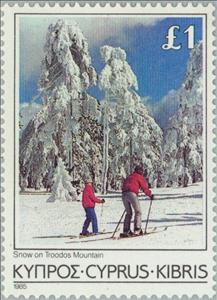Stamp: Snow on Troodos Mountain (Cyprus 1985)
Snow on Troodos Mountain (Cyprus 1985)
18 March (Cyprus ) within release Tourism goes into circulation Stamp Snow on Troodos Mountain face value 1 Cypriot pound
| Stamp Snow on Troodos Mountain in catalogues | |
|---|---|
| Michel: | Mi:CY 639 |
Stamp is vertical format.
Also in the issue Tourism:
- Stamp - Autumn at Platania, Troodos Mountain face value 1;
- Stamp - Ayia Napa Monastery face value 2;
- Stamp - Panoramic View of Phini village face value 3;
- Stamp - Kykkos Monastery, Troodos Mountain face value 4;
- Stamp - Makronissos Beach, Ayia Napa face value 5;
- Stamp - Picturesque Village Street, Omodhos face value 6;
- Stamp - Panoramic Seaview, Limassol face value 10;
- Stamp - Wind-surfing in Paphos face value 13;
- Stamp - Beach at Protaras face value 15;
- Stamp - Forestry for development face value 20;
- Stamp - Sunrise at Protaras face value 25;
- Stamp - Houses at Pera Orinis Village face value 30;
- Stamp - Sanctuary of Apollo Ylates, Limassol face value 50;
- Stamp - Snow on Troodos Mountain face value 1;
- Stamp - Personification of Autumn, Mosaic, Paphos face value 5;
Stamp Snow on Troodos Mountain it reflects the thematic directions:
In botany, a tree is a perennial plant with an elongated stem, or trunk, supporting branches and leaves in most species. In some usages, the definition of a tree may be narrower, including only woody plants with secondary growth, plants that are usable as lumber or plants above a specified height. Trees are not a taxonomic group but include a variety of plant species that have independently evolved a woody trunk and branches as a way to tower above other plants to compete for sunlight. In looser senses, the taller palms, the tree ferns, bananas and bamboos are also trees. Trees tend to be long-lived, some reaching several thousand years old. The tallest known tree, a coast redwood named Hyperion, stands 115.6 m (379 ft) high. Trees have been in existence for 370 million years. It is estimated that there are just over 3 trillion mature trees in the world. A tree typically has many secondary branches supported clear of the ground by the trunk. This trunk typically contains woody tissue for strength, and vascular tissue to carry materials from one part of the tree to another. For most trees it is surrounded by a layer of bark which serves as a protective barrier. Below the ground, the roots branch and spread out widely; they serve to anchor the tree and extract moisture and nutrients from the soil. Above ground, the branches divide into smaller branches and shoots. The shoots typically bear leaves, which capture light energy and convert it into sugars by photosynthesis, providing the food for the tree's growth and development. Flowers and fruit may also be present, but some trees, such as conifers, instead have pollen cones and seed cones; others, such as tree ferns, produce spores instead. Trees play a significant role in reducing erosion and moderating the climate. They remove carbon dioxide from the atmosphere and store large quantities of carbon in their tissues. Trees and forests provide a habitat for many species of animals and plants. Tropical rainforests are one of the most biodiverse habitats in the world. Trees provide shade and shelter, timber for construction, fuel for cooking and heating, and fruit for food as well as having many other uses. In parts of the world, forests are shrinking as trees are cleared to increase the amount of land available for agriculture. Because of their longevity and usefulness, trees have always been revered, with sacred groves in various cultures, and they play a role in many of the world's mythologies.
Sports, are all usually forms of competitive physical activity or games which, through casual or organised participation, aim to use, maintain or improve physical ability and skills while providing enjoyment to participants, and in some cases, entertainment for spectators. Usually the contest or game is between two sides, each attempting to exceed the other. Some sports allow a tie game; others provide tie-breaking methods, to ensure one winner and one loser. A number of such two-sided contests may be arranged in a tournament producing a champion. Many sports leagues make an annual champion by arranging games in a regular sports season, followed in some cases by playoffs. Hundreds of sports exist, from those between single contestants, through to those with hundreds of simultaneous participants, either in teams or competing as individuals. In certain sports such as racing, many contestants may compete, each against each other, with one winner.
Tourism is travel for pleasure or business; also the theory and practice of touring, the business of attracting, accommodating, and entertaining tourists, and the business of operating tours. Tourism may be international, or within the traveller's country. The World Tourism Organization defines tourism more generally, in terms which go "beyond the common perception of tourism as being limited to holiday activity only", as people "traveling to and staying in places outside their usual environment for not more than one consecutive year for leisure, business and other purposes". Tourism can be domestic or international, and international tourism has both incoming and outgoing implications on a country's balance of payments. Today, tourism is a major source of income for many countries, and affects the economy of both the source and host countries, in some cases being of vital importance.



